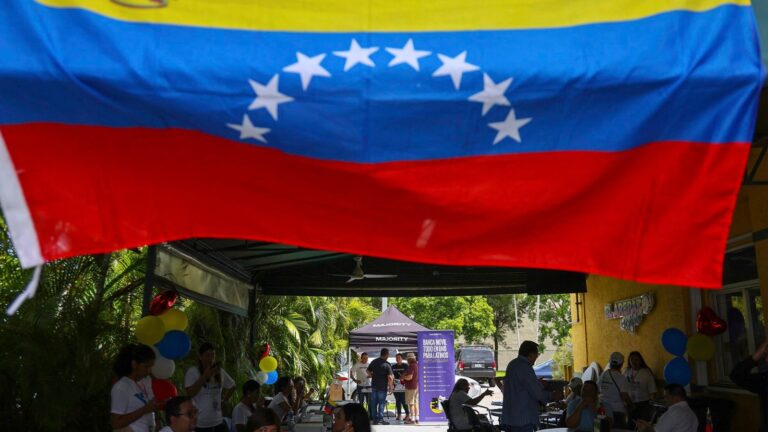Venezuelans lined up at polling stations to cast their votes on Sunday. The most important election in a quarter century for the Socialist governmentPresident Nicolas Maduro remains confident of victory despite passionate opposition support and warnings of possible fraud.
Opposition leader Maria Corina Machado has been a star of the coalition’s campaign despite being barred from holding public office, forcing her to hand over the baton to candidate Edmundo Gonzalez, a 74-year-old former diplomat known for his calm demeanor.
Gonzalez has the backing of some former supporters of the ruling party, but opposition parties and observers have questioned whether the vote will be fair, saying the electoral authorities’ decisions and the arrests of opposition officials were designed to create obstacles.
Maduro, whose 2018 re-election was deemed fraudulent by the United States and other countries, has said Venezuela has the most transparent electoral system in the world and has warned of “bloodshed” if he is defeated.
Reuters journalists reported queues outside seven polling stations across the country, some of which opened late and where voting was slow, with many voters arriving before dawn.
“I work cleaning houses and my four grandchildren depend on me. I earn just $15 a week, which eats one day but not the next,” said Luisa Gonzalez, 61, who voted in Bolivar state, traditionally a ruling party stronghold.
“We have been asking for change for years. I was a Chavista but people have changed,” she added, referring to late President Hugo Chavez and supporters of the ruling party.
Polls close at 6pm local time (2200 GMT) with results likely to be announced on Sunday night or the following day.
Maduro’s regime has led to an economic collapse, the exodus of about a third of the population, a sharp deterioration in diplomatic relations, and sanctions imposed by the United States, European Union and other organisations that have dealt a further blow to an already struggling oil industry.
Maduro says he will guarantee peace and economic growth, reducing Venezuela’s reliance on oil revenues.
With a minimum wage equivalent to $3.50 a month, the cost of basic food for a family of five is estimated at about $500. Many people receive food rations from the government or remittances from relatives abroad.
Dozens of voters cast their ballots at the Venezuelan consulate on the Spanish island of Tenerife, while others gathered outside waving flags and cheering.
Several voters said they had registered with consulates years ago. Migrants around the world say they have had difficulty registering, and only a small proportion of them are likely to be able to vote.
Chavez’s Legacy
President Maduro voted in Caracas early in the morning and said the results announced by the National Electoral Commission would be recognized and protected by the military and police.
Maduro said he would decree a national dialogue on Monday, using the term to refer to a dialogue between the government, the opposition, businesses and local communities.
Many of Maduro’s supporters speak glowingly of his mentor, Chavez, and see Maduro, who has held power since Chavez’s death in 2013, as an heir to Chavez’s legacy of helping the poor.
Others told Reuters they supported Maduro despite mixed reviews of his record. “Our country definitely has things to improve, but this government has weathered unprecedented sanctions and blockades, which is why I support him and think he should be given another chance,” Jose Lopez, 57, told Reuters as he waited to vote in central Valencia.
Gonzalez and Machado promised big reforms, said a fresh start could encourage migrants to return, and urged people to rally at polling stations. They said they expected the military to uphold the results of the vote.
Gonzalez voted around midday in Caracas, while Machado voted in the mid-afternoon, appearing before a crowd of cheering supporters and reporters. The opposition posted a video earlier in the day of her being transported on the back of a motorbike, greeting supporters and posing for photos.
Venezuela’s military has always supported President Maduro, a 61-year-old former bus driver and foreign minister, and there have been no public signs that military leaders would defect from the government.
Gonzalo Himiob, deputy head of the human rights group Foro Penal, said on X that 22 people had been arrested since Friday “in connection with the electoral process” and that at least 15 remained in detention.
Venezuela’s attorney general this week denied any involvement in political persecution.
Analysts say public spending has only increased slightly during the election period, a departure from past election periods when spending was lavish.
According to an event broadcast on state television, Maduro said he had launched 70 public works projects in the past few months, many of which were upgrades to existing schools, hospitals and roads.

